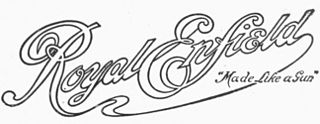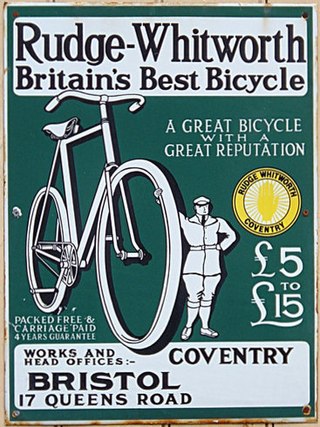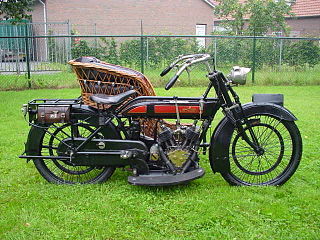
The Norton Motorcycle Company is a brand of motorcycles headquartered in Solihull, West Midlands,, England. For some years around 1990, the rights to use the name on motorcycles was owned by North American financiers.
Triumph Engineering Co Ltd was a British motorcycle manufacturing company, based originally in Coventry and then in Meriden. A new company, Triumph Motorcycles Ltd, based in Hinckley, gained the name rights after the end of the company in the 1980s and is now one of the world's major motorcycle manufacturers.

A. J. Stevens & Co. Ltd was a British automobile and motorcycle manufacturer in operation from 1909 to 1931. The company was founded by Joe Stevens in Wolverhampton, England. After the firm was sold, the name continued to be used by Matchless, Associated Motorcycles and Norton-Villiers on four-stroke motorcycles until 1969, and since the name's resale in 1974, on lightweight, two-stroke scramblers and today on small-capacity roadsters and cruisers. The company held 117 motorcycle world records.

Royal Enfield was a brand name under which The Enfield Cycle Company Limited of Redditch, Worcestershire sold motorcycles, bicycles, lawnmowers and stationary engines which they had manufactured. Enfield Cycle Company also used the brand name "Enfield" without the "Royal".

Excelsior, based in Coventry, was a British bicycle, motorcycle and car maker. They were Britain’s first motorcycle manufacturer, starting production of their own ‘motor-bicycle’ in 1896. Initially they had premises at Lower Ford Street, Coventry, and 287-295 Stoney Stanton Road, Hillfields, Coventry, Warwickshire before moving to Kings Road, Tyseley, Birmingham in 1921.

JA Prestwich Industries, was a British engineering equipment manufacturing company named after founder John Alfred Prestwich, which was formed in 1951 by the amalgamation of J.A.Prestwich and Company Limited and Pencils Ltd.

Coventry Premier Limited owned a British car and cyclecar manufacturing business based in Coventry from 1912 to 1923. It changed its name from Premier Cycles to Coventry Premier Ltd in November 1914.

The New Hudson Cycle Co. was originally started in 1890 by George Patterson, and manufactured 'safety' bicycles in Birmingham. In 1903 they produced their first motorcycle, but times became tough for Patterson after one of his sons died in WW1 and the other lost a leg. The family sold the factory to HJ Bructon after WW1, and in 1920 the company was reformed as New Hudson Ltd.

Villiers Engineering was a manufacturer of motorcycles and cycle parts, and an engineering company based in Villiers Street, Wolverhampton, England.

The Cotton Motor Company, was a British motorcycle manufacturer of 11a Bristol Road, Gloucester, and was founded by Frank Willoughby Cotton in 1918. F.W. presided over the company until his retirement in 1953. The company was reconstituted as E. Cotton (Motorcycles) Ltd, and traded until 1980. The marque was later resurrected in the late 1990s by a business which manufactured replicas of earlier machines.

Rudge Whitworth Cycles was a British bicycle, bicycle saddle, motorcycle and sports car wheel manufacturer that resulted from the merger of two bicycle manufacturers in 1894, Whitworth Cycle Co. of Birmingham, founded by Charles Henry Pugh and his two sons Charles Vernon and John, and Rudge Cycle Co. of Coventry.

Douglas was a British motorcycle manufacturer from 1907 to 1957 based in Kingswood, Bristol, owned by the Douglas family, and especially known for its horizontally opposed twin cylinder engined bikes and as manufacturers of speedway machines. The company also built a range of cars between 1913 and 1922.
Rex, Rex Motorcycles, Rex-Acme, was a car and motorcycle company which began in Birmingham, England in 1900. Rex soon merged with a Coventry maker of bicycles and cars named Allard and then later in 1922 the company merged with Coventry's 'Acme' motorcycle company forming 'Rex Acme'. The company existed until 1933, and, in its heyday, was considered one of the greatest names in the British motorcycle industry.

Francis & Barnett Limited was an English motorcycle manufacturer founded in 1919 by Gordon Inglesby Francis and Arthur Barnett and based in Lower Ford Street, Coventry, England. Early motor cycles were affectionately known as ' Franny B'. Motorcycles were produced for enthusiasts and was reasonably affordable for citizens for use as general transport. The majority of the lighter motorcycles used Villiers and later Two-stroke engine and later Associated Motor Cycles AMC engines. During the 1930s the 250cc Cruiser model 250 cc (15 cu in) was developed with a faired engine that protected those riding from any oil or dirt – one of the first of its kind to do so. AMC took over Francis & Barnett Limited in 1947 combining this with the James motorcycle models in 1957. The combined company remained in business until 1966.

The Campion Cycle Company was a British bicycle, cyclecar and motor cycle maker, active from 1893 to 1926 and based in Nottingham, England. In 1927 it was purchased by Currys.

Hazlewoods Limited of Coventry were manufacturers of bicycles from 1895, and motorcycles from 1911 until closure c. 1923. They were typical many British companies who proceeded from bicycle manufacture to motorised bicycles, a change made possible by engine and geared hub suppliers.

BSA motorcycles were made by the Birmingham Small Arms Company Limited (BSA), which was a major British industrial combine, a group of businesses manufacturing military and sporting firearms; bicycles; motorcycles; cars; buses and bodies; steel; iron castings; hand, power, and machine tools; coal cleaning and handling plants; sintered metals; and hard chrome process.

The Bown Manufacturing Company was established in 1862 in Birmingham by local machinist, William Bown, making a variety of patented mechanical parts. The name Aeolus had been used as a trademark since 1877 and especially for cycle parts. A second-cousin took over the company when the founder died in 1900 and began making powered-cycles also under the Aeolus brand. Production was interrupted by the First World War, after which motorcycles were marketed under the Bown brand until 1924. The company was subsequently acquired by the Aberdale Cycle Company in the 1930s.
F. E. Baker Ltd was a British motorcycle engine and cyclecar engine manufacturer based in the Precision Works, Moorsom Street, Birmingham, England. Founded in 1906 by Frank Edward Baker, the company produced motorcycle engines under the Precision trademark until 1919. Precision engines were used by a wide range of motorcycle manufacturers in the United Kingdom and in other parts of the Commonwealth and were also used in cyclecars. Many manufacturers used the 'Precision' trademark as part of their model names, and in 1912 there was a 'Precision' motorcycle sold in Australia, but it is unclear if this was manufactured by F.E. Baker or just permitted use of the trademark by a motorcycle manufacturer.
The Ackland Motorcycles Co is a defunct British motorcycle manufacturer. The company was founded by William Charles Ackland (1871-1942) in 1895 and originally manufactured cycles. The company was located on St. Mary's Road in Southampton. Ackland's son William George Ackland (1903-1994) later joined the company.
















